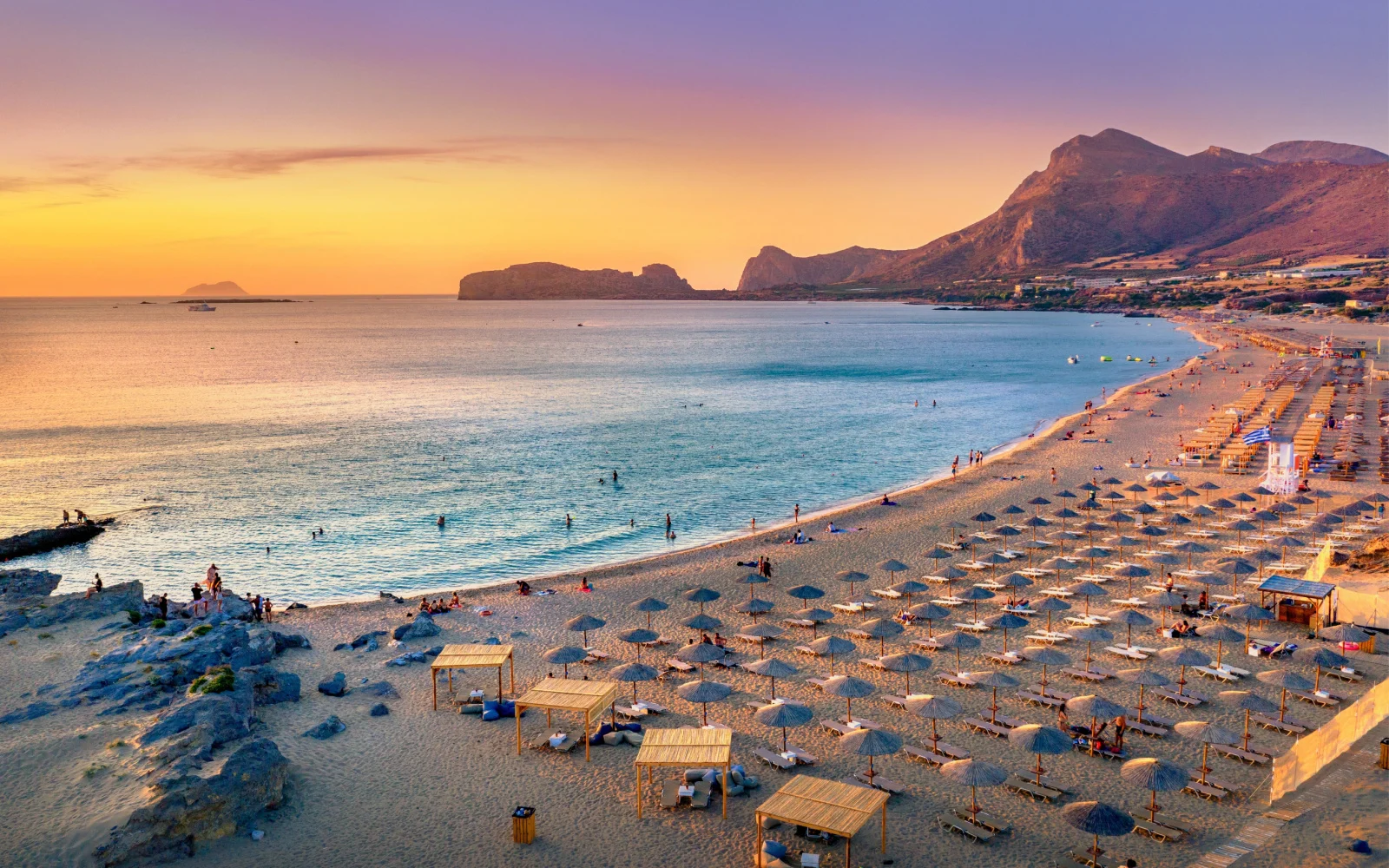The Greek island of Crete is one of the most popular tourist destinations for vacationers to the Mediterranean country. The island receives nearly five million visitors by air alone, not counting how many arrive by ferry from other Greek islands.
Crete is a vast island full of beautiful beaches, stark lunar landscapes, and thousands of years of history. Check out the ruins of the mysterious ancient Minoan civilization at the Palace of Knossos. Visit the charming towns of Chania and Heraklion, famous for their food and nightlife.
Of course, enjoy the beautiful nature of the island such as the remote beaches of the southern coast and the rocky Samaria Gorge.
Crete is the perfect place to go if you’re looking for Mediterranean adventures. However, it’s always good to think about more practical concerns before planning your trip, such as safety.
This travel guide can help you prepare to visit Crete safely. Keep reading to learn more about potential challenges you might face, including crime.
Is Crete Safe to Visit in 2024?
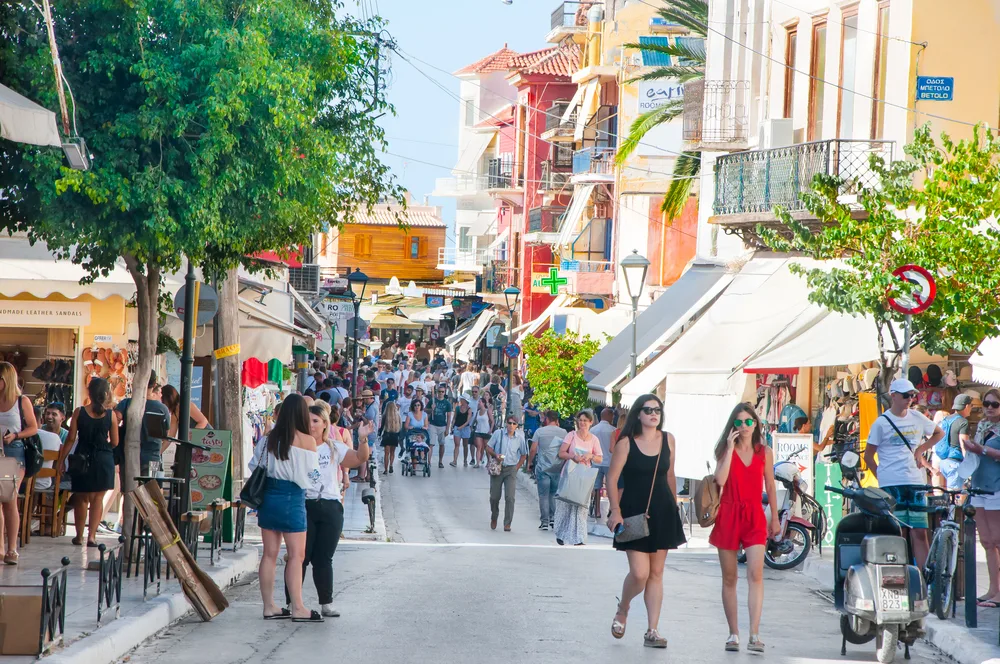
CHANIA,CRETE-AUGUST 08: Narrow street with local restaurants and traditional shops, tourists go shopping on August 08,2017 in Chania city on Crete island, Greece./lornet/Shutterstock
Yes. Crete, like many Greek islands, is very safe to visit! The island has a low crime rate and few other dangers. You may run into exceptional events, such as protests or wildfires, but as long as you do your research ahead of time, you should be safe.
It makes sense that Crete is safe to visit when Greece as a country is safe to visit. Most countries, such as Canada, put Greece on the lowest level of travel advisory possible. Of course, the country still has problems.
Common problems that you might encounter in Greece include:
- Pickpocketing
- Bag snatching
- Scams
- Sexual harassment
- Mugging
- Hate crimes
- Civil unrest
These are all problems that are present in Greece, and you may encounter them in Crete as well — but very rarely. The crime rate overall in Greece is low, and it gets much lower once you leave the two major cities of Athens and Thessaloniki. On islands such as Crete, the crime rate is very low.
However, Crete is not just a vacation destination. Its main city, Heraklion, is actually the fifth-biggest city in Greece and you may run into the same problems that you might expect in any big city, such as street crime.
Heraklion also periodically experiences protests (Greeks are infamous for their penchant for taking to the streets and sometimes setting trash cans on fire when they are not satisfied).
For example, in March 2023, there were protests in both Chania and Heraklion in response to a train accident that killed dozens of students in Greece. Protests in Crete don’t tend to be as violent as those in Athens, but clashes can still happen, so it’s best to avoid any large political gatherings.
Another Greece-wide problem that also unfortunately affects Greece is the problem of racially and religiously motivated hate crimes. Hate crimes have increased as more and more refugees arrive in Greece, many of which are housed in island camps.
Crete has a few camps for asylum seekers, but they are small, especially when compared to the massive complexes on other islands such as Lesvos.
Human Rights Watch recorded several attacks on immigrants in Crete and has been alerting authorities to this problem for over a decade. Tourists who have darker skin may be targeted with verbal harassment, although more serious incidents affecting people on vacation are rare.
Unfortunately, Crete is not equally safe for all visitors. Crete is also at risk of some natural disasters, namely wildfires.
In July 2023, extreme temperatures caused large wildfires in many locations in Greece. Crete was put on high alert during the wildfires, although it was not one of the islands affected the most.
As Greece’s summers get more and more extreme, wildfires are an ever-present risk, especially in arid areas such as Crete. Make sure that you follow local news and weather alerts while you are in town.
Your accommodation or host will probably inform you if there are evacuation orders, and the authorities will help you get to safety just in case something happens.
During the shoulder season, which is April-June and September-October, your risk of encountering wildfires goes down as the weather is cooler. More and more tourists are opting to visit during this time instead of the summer.
Crime in Crete
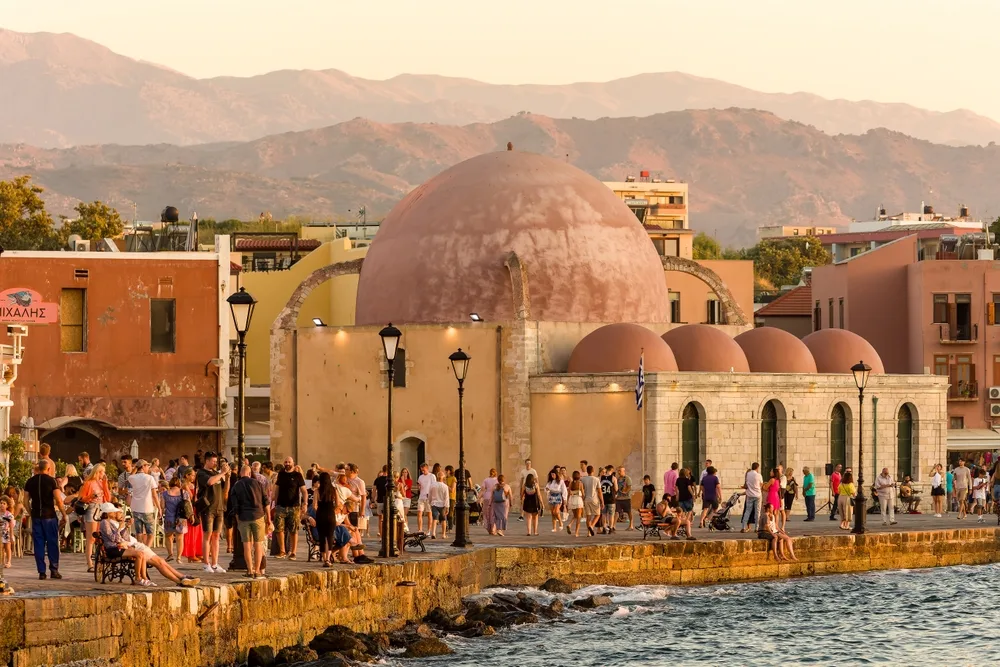
CRETE, GREECE – JULY 03 2023: Crowds of tourists in the evening near the old mosque at the old venetian harbor of Chania on the island of Crete/Richard Whitcombe/Shutterstock
For potential visitors to Crete, crime is probably the most common problem that you might encounter. The crime rate is not very high, but crime still happens, the same way that it happens anywhere in the world.
According to Numbeo, the crime rate in Crete is very low. The island scores a 15.70 out of 100 on the crime index, which is a very low score. Even when Numbeo breaks down the crime index into more specific categories of crimes, the values remain low to very low.
The most common crimes that people in Crete worry about are corruption and bribery, vandalism, theft, and drug abuse. However, even with these most common crimes, the level of crime is still low. There just isn’t that much crime.
Most crimes that occur in Crete are property crimes or other petty offenses. The rate of violent crime is even lower than the rate of property crimes. Violent incidents are practically unheard of in Greece.
Where crimes occur in Greece is also very concentrated. Heraklion, the main city, has a higher crime rate than the rest of the island, scoring a 19.37 on the overall Numbeo crime index.
Other large towns such as Chania and party towns such as Malia also have slightly elevated crime rates compared to the island average. In smaller villages, crime is practically nonexistent.
In fact, you might see locals leaving their cars and homes unlocked because they feel so safe! You don’t have to worry about your safety when you’re on vacation in Crete.
Obviously, this doesn’t mean that you should be careless, such as leaving your phone in plain sight on your beach chair as you go swimming, but you don’t have to be on constant alert against crime either. Crete is a close-knit community with low levels of crime.
Petty Theft
The crime you are most likely to encounter in Crete, as in many other tourist destinations, is petty theft. Petty theft is not nearly as common in Crete as in other popular Mediterranean destinations such as Barcelona, or even in other popular Greek tourist destinations such as Athens, but it can occur.
In its travel advisory for the country of Greece, the Australian government warns tourists to stay alert against petty theft on popular tourist islands, and that includes Crete. Thieves often target tourists for their crimes as they know that tourists are more likely to have valuables with them (and less likely to be savvy to their threats).
Most forms of theft on Crete are non-violent, such as pickpocketing and bag snatching. Thieves prefer to take advantage of a victim’s inattention, such as by rifling through unattended bags on the beach and then starting a violent confrontation, for instance.
That makes it easier to prevent and stop thefts from occurring to you. Most travel advisories for Greece emphasize the importance of keeping physical contact with your valuables when you are out and about.
This is good advice for Crete as well, especially when you are in crowded places such as the streets of Heraklion or the nightclubs of Malia. Make sure that you have a physical hold on your bag and opt for a bag that is more secure, such as a cross-body bag.
Make sure that you never, ever leave valuables unattended. Thieves tend to take advantage of places where travelers let their guard down, such as the beach, hotel lobbies, and nightclubs.
A split second of inattention could mean that you will be parted forever with your phone, so always make sure you hold onto your things.
Sexual Harassment and Assault
Female travelers face additional risk levels when traveling, and unfortunately Crete is no different. Some women who visit Crete complain about the sexual harassment they experience. Verbal harassment such as catcalling is common throughout Greece, including Crete.
Follow the lead of local women and ignore the catcalls and stares. If you feel uncomfortable, stick to more crowded areas with other women around to avoid a situation escalating.
More serious incidents such as sexual assault do happen. There have been a few high-profile incidents affecting tourists, such as the assault of a solo female traveler by her taxi driver and the assault of a teenager by two men on a beach.
These incidents are horrific, but they are not representative of Crete as the rate of sexual assault is low on the island. If you are a female traveler, you should take some precautions to keep yourself safe.
Avoid isolated beaches as those tend to attract criminals. Make sure that the beaches you are on have at least a few other people around.
Crete’s nightlife is very popular, but the risk of sexual assault is higher in party areas such as Heraklion and Malia. Criminals can be locals or fellow tourists. Drink spiking happens in Crete’s nightclubs, so never leave your drinks unattended or accept drinks from strangers.
Only go clubbing with a trusted buddy or group, and never let anyone from your group separate from your group, especially if they are heading somewhere with a stranger.
Avoiding Bad Areas
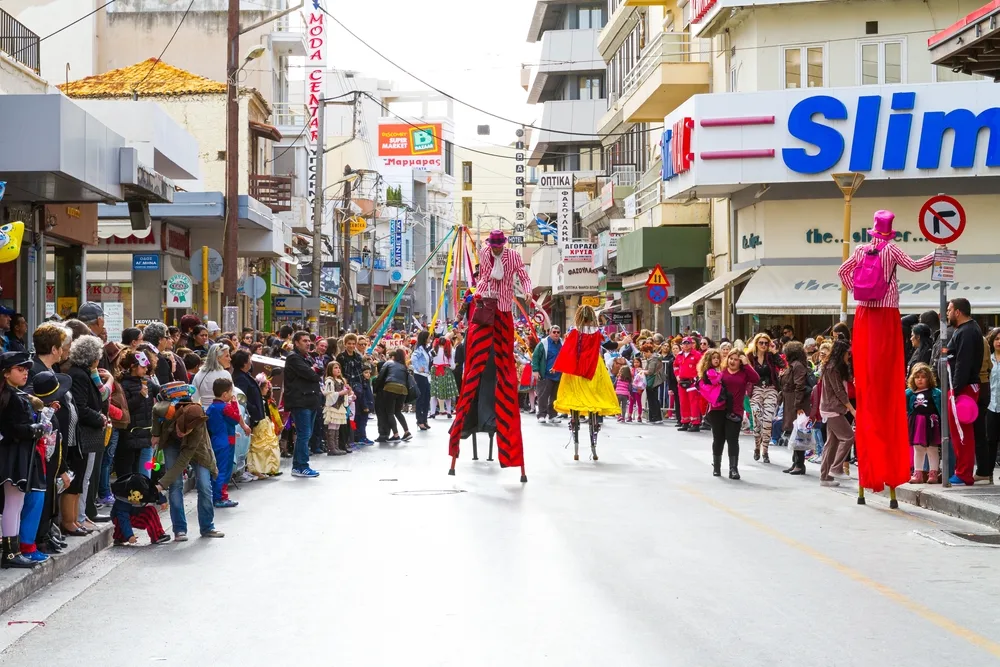
Heraklion, Crete, Greece, March 12, 2016: Theatrical actors walking on stilts in annual carnival parade at Heraklion city./GP PHOTOTRENDS/Shutterstock
Since Crete overall is so safe, there are few areas that you need to avoid at all costs. In Heraklion, there are a few neighborhoods that feel sketchy after dark.
You don’t want to be walking around alone in the port area at night as it feels more run-down. Party areas such as the beach town of Malia can get rowdy, especially as the night goes on.
They may not be the most comfortable place to be, especially for female travelers. Plus, criminals tend to operate around popular party areas because they know that drunk people make easy targets.
Things to Consider
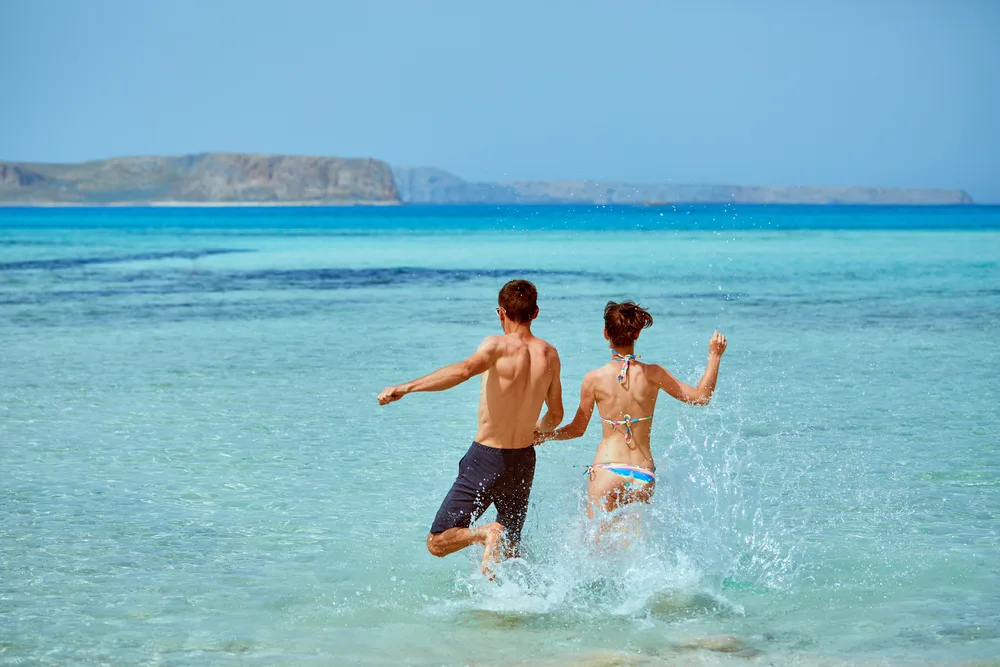
Vitalii Matokha/Shutterstock
Here are a few additional safety tips that you should keep in mind when visiting Crete:
- Protect yourself against the sun. The Greek sun is very powerful, especially in the summer. Make sure that you apply high SPF sunscreen regularly. You’ll rarely see local Cretans walking around at noon on a summer day, so follow their lead and stay indoors.
- Be very careful if you’re driving. The roads in Crete are very narrow and winding to navigate the hilly terrain. Plus, you’ll run into obstacles in the form of Greek drivers, who have a very loose relationship with the rules of the road, and even stray goats. If you’re renting a car, make sure that you pack your patience.
- Don’t flush toilet paper. The sewage pipes on most Greek islands are not thick enough to process toilet paper, and you might cause an unintentional (embarrassing) clog. Instead, most accommodations and public restrooms have a trash basket for disposing of toilet paper.
Frequently Asked Questions
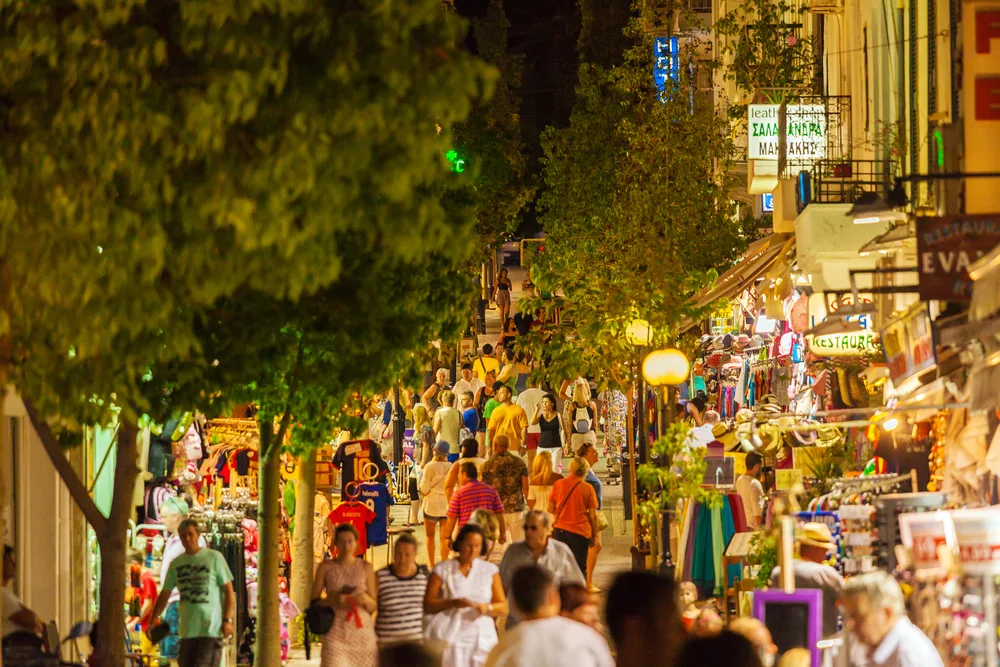
AGIOS NIKOLAOS, CRETE – JULY 28, 2012: Hundreds of tourists on the main pedestrian street with shops and restaurants on Crete by night/Rostislav Ageev/Shutterstock
Here are a few common questions that visitors to Crete have asked before:
How safe is Crete for tourists?
Crete is very safe for tourists. It has a very low crime rate, and tourists are rarely victims of anything besides the occasional petty theft.
Is it safe to walk in Crete at night?
Most of Crete is safe to walk at night, except for a few neighborhoods of Heraklion. You should still take some precautions such as sticking to well-lit areas.
Is Crete safe for female tourists?
Crete is generally safe for female tourists, but there have been incidents of sexual harassment and even assault in the past. You should take some precautions, such as not going clubbing alone, to protect yourself.
Why is Crete so cheap?
Unlike many other Greek islands, Crete is relatively affordable for visitors and locals alike. That’s because the cost of living is lower and Crete has to import less of its basic goods.
What is crime like in Crete?
Crime rates are very low in Crete. What crime exists tends to be petty theft or other non-violent incidents.
So, Is Crete Safe to Visit?
The island of Crete is very safe to visit! Thanks to its low crime rate and relaxed attitude, almost all travelers who visit have a good time.
So, with so much to see and do and a very safe environment in which to stay, what are you waiting for — book your trip today and experience for yourself all that Crete has to offer. Happy travels!



